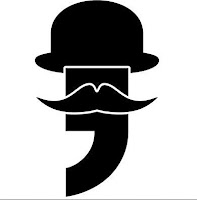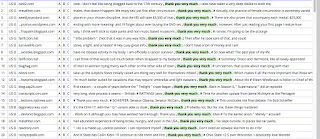I was tweet-talking with Lane Greene this morning about whether Americans' love for/Britons' indifference to optional commas can be quantified. And so I did a little experiment. And so I'm going to tell you about it.
For this I'm comparing the British National Corpus and the Corpus of Contemporary American English. (They're not 100% comparable, but they'll do.) In the BNC, there's on average 1 comma for every 20 words written. In COCA, it's 1:15. So, there are a lot more commas in the American corpus. (I tried this on the GloWBE corpus too, and got about 10% more commas in AmE than BrE–but it's harder to know in GloWBE that the writers are from the country that they're categori{s/z}ed in.)
That doesn't tell us that Americans like optional commas more, though. That could mean that Americans like the grammatical constructions that require commas more than Brits do. Or it could mean that Americans write longer lists than Brits do. To really know, we need to look in contexts where the comma might occur and see if it's there. I did this for one context last year and found that my American friends were about twice as likely to use a comma (versus not using one) in the phrase "Happy Birthday(,) Lynne", and my British friends patterned in the opposite way.
So here are a few more contexts.
After a short, sentence-initial adverbial: If you want to modify a sentence with 'when, where, why or how', you can use a prepositional phrase or an adverb. Usually, these wouldn't have commas around them, but, at the start of the sentence, they often do, to mark the particular prosodic (intonational) pattern that goes with such phrases and to help the reader know that the subject of the sentence has not turned up yet.
To look at this, I decided to try sentences that start with phrases like "In 1973..." So I searched the corpora for:
And this is what you get:
In other words, (more than) twice as many commas as not in AmE, and the opposite in BrE—just as we found in the birthday vocatives. (The US corpus is much larger than the UK one, so it works best to compare the ratios between countries.)
On to the next context:
The serial/Oxford comma: I was once one of those people who thought that having a firm stand on the Oxford comma was a good thing. I now think it's pretty silly. We don't need tribalism in punctuation any more than we need tribalism in the rest of life. But oh well. There's a lot of it if you hang out in the part of Twitter that I hang out in.
A quick definition for those outside the punctuation-culture wars: the serial, or Oxford, comma is a comma before the conjunction (usually and or or) in a list of three or more. So:
Serial comma is the older (1922), orig.-AmE name for the thing. The term Oxford comma (after the Oxford University Press) is newer (1951) and now the more popular term in the US. Why? Because, as Mary Norris, in her Between You and Me: Confessions of a Comma Queen, puts it: Oxford “gives it a bit of class, a little snob appeal”. And that's what the punctuation-culture wars are about. FiveThirtyEight found that Americans who prefer the Oxford comma tend to pat themselves on the back about their grammar knowledge. John McIntyre of the Baltimore Sun (quoted at last link) concludes that “Feigned passion about the Oxford comma, when not performed for comic effect, is mere posturing.”
Anyhow, Americans do have a reputation among editors for liking that comma more than Brits do.
Is the reputation well founded?
I looked in the aforementioned corpora for
And I found:
So, it is true that Americans use the Oxford comma more than Brits do. But it's not true that Americans use the Oxford comma more than not.
And if you grew up in the US at the same time as I did, thinking about lists containing butter might make you think of this Sesame Street gem, now stuck in my head for the rest of the day:
For this I'm comparing the British National Corpus and the Corpus of Contemporary American English. (They're not 100% comparable, but they'll do.) In the BNC, there's on average 1 comma for every 20 words written. In COCA, it's 1:15. So, there are a lot more commas in the American corpus. (I tried this on the GloWBE corpus too, and got about 10% more commas in AmE than BrE–but it's harder to know in GloWBE that the writers are from the country that they're categori{s/z}ed in.)
That doesn't tell us that Americans like optional commas more, though. That could mean that Americans like the grammatical constructions that require commas more than Brits do. Or it could mean that Americans write longer lists than Brits do. To really know, we need to look in contexts where the comma might occur and see if it's there. I did this for one context last year and found that my American friends were about twice as likely to use a comma (versus not using one) in the phrase "Happy Birthday(,) Lynne", and my British friends patterned in the opposite way.
So here are a few more contexts.
After a short, sentence-initial adverbial: If you want to modify a sentence with 'when, where, why or how', you can use a prepositional phrase or an adverb. Usually, these wouldn't have commas around them, but, at the start of the sentence, they often do, to mark the particular prosodic (intonational) pattern that goes with such phrases and to help the reader know that the subject of the sentence has not turned up yet.
To look at this, I decided to try sentences that start with phrases like "In 1973..." So I searched the corpora for:
. In 19* (,) theThat is to say, a (BrE) full stop/(AmE) period followed by in followed by anything starting with 19 (which ended up just being year-names), then a comma or no comma, then the word the. The the ensures that I'm not getting longer phrases at the start. So every hit is something like "In 1973(,) the band released their best album" and not things like "In 190 years of customer service at their Oxford Street branch (,) they'd never before killed a customer". That way, I've got a uniform set of short sentence-initial adverbials. (The longer ones are more apt to have commas in BrE; it's just the short adverbials I'm testing.)
And this is what you get:
| comma | none | ratio | |
|---|---|---|---|
| UK | 495 | 1095 | 1:2 |
| US | 3445 | 1449 | 2:1 |
In other words, (more than) twice as many commas as not in AmE, and the opposite in BrE—just as we found in the birthday vocatives. (The US corpus is much larger than the UK one, so it works best to compare the ratios between countries.)
On to the next context:
 |
| You can visit the Oxford Comma on Twitter Pic by @rcasinelli |
The serial/Oxford comma: I was once one of those people who thought that having a firm stand on the Oxford comma was a good thing. I now think it's pretty silly. We don't need tribalism in punctuation any more than we need tribalism in the rest of life. But oh well. There's a lot of it if you hang out in the part of Twitter that I hang out in.
A quick definition for those outside the punctuation-culture wars: the serial, or Oxford, comma is a comma before the conjunction (usually and or or) in a list of three or more. So:
Oxford: I like blogs, dictionaries, and world peace.
Non-Oxford: I like blogs, dictionaries and world peace.
Serial comma is the older (1922), orig.-AmE name for the thing. The term Oxford comma (after the Oxford University Press) is newer (1951) and now the more popular term in the US. Why? Because, as Mary Norris, in her Between You and Me: Confessions of a Comma Queen, puts it: Oxford “gives it a bit of class, a little snob appeal”. And that's what the punctuation-culture wars are about. FiveThirtyEight found that Americans who prefer the Oxford comma tend to pat themselves on the back about their grammar knowledge. John McIntyre of the Baltimore Sun (quoted at last link) concludes that “Feigned passion about the Oxford comma, when not performed for comic effect, is mere posturing.”
Anyhow, Americans do have a reputation among editors for liking that comma more than Brits do.
Is the reputation well founded?
I looked in the aforementioned corpora for
butter , [noun] (,) and [noun]Why butter? Because if I tried to search for "noun, noun(,) and noun", the computer couldn't cope. I needed to stick a particular noun in there to bring the amount of data down. The second phrase gives me more data to work with, but since it's a set phrase, I didn't want to use just it in case it garbled the results. (In the end, there are apparently fewer discussions of ingredients in the BNC than COCA, so the butter examples didn't do much for the numbers. But I have to leave it at that because I need to get back to work.)
men , women (,) and children
And I found:
| Oxford comma | none | ratio | |
|---|---|---|---|
| UK | 4+11 | 24+124 | 1:10 |
| US | 109+310 | 129+434 | 1:1.3 |
So, it is true that Americans use the Oxford comma more than Brits do. But it's not true that Americans use the Oxford comma more than not.
And if you grew up in the US at the same time as I did, thinking about lists containing butter might make you think of this Sesame Street gem, now stuck in my head for the rest of the day:








